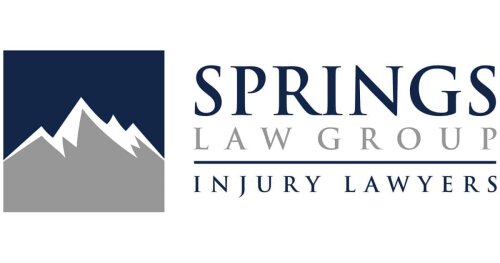Best Travel Accident Lawyers in Colorado
Share your needs with us, get contacted by law firms.
Free. Takes 2 min.
Or refine your search by selecting a city:
List of the best lawyers in Colorado, United States

About Travel Accident Law in Colorado, United States
Travel accident law in Colorado refers to the legal issues and protections surrounding injuries and damages sustained while traveling. This includes car, bus, train, bicycle, pedestrian, or rideshare accidents that occur during travel within, to, or from Colorado. Accidents may involve tourists, business travelers, or residents, and can result from negligence, hazardous conditions, or transportation provider errors. Colorado law offers pathways for victims to recover compensation for injuries, lost wages, medical expenses, and other damages related to travel accidents.
Why You May Need a Lawyer
People involved in travel accidents often face complex legal situations, especially if they are unfamiliar with local laws or are from out of state. Here are some common scenarios where a lawyer can be valuable:
- Determining liability in accidents involving multiple parties or vehicles
- Navigating insurance claims and disputes, especially when different insurers are involved
- Pursuing compensation for medical bills, lost income, or pain and suffering
- Addressing injuries or damages caused by public transportation, rideshare services, or tourism operators
- Handling cases involving out-of-state visitors or international travelers
- Understanding Colorado’s unique auto accident and personal injury laws
- Negotiating fair settlements or representing your interests in court
- Addressing accidents in recreational or high-altitude areas, where special laws or regulations may apply
Local Laws Overview
Colorado’s legal landscape for travel accidents includes several important features:
- Comparative Negligence: Colorado applies a modified comparative negligence rule. If you are found to be 50 percent or more at fault, you may not recover damages. If you are less than 50 percent at fault, your compensation may be reduced by your percentage of fault.
- Statute of Limitations: The typical deadline to file a personal injury claim after a travel accident is three years from the date of the accident for vehicle-related incidents. Different time limits may apply to non-automobile travel accidents.
- Auto Insurance Requirements: Colorado requires drivers to carry minimum amounts of liability insurance. The state operates under a fault-based system, meaning the at-fault party’s insurer generally covers damages.
- Public Transportation Accidents: Claims against government entities or public transportation providers may have shorter notice deadlines and special procedures.
- Rideshare and Tourism Operators: When involved in accidents with rideshare companies or tourism businesses, special insurance policies and laws may come into play.
- Out-of-State and International Visitors: Visiting drivers must follow Colorado’s traffic laws, and their home country or state insurance policies may interact with Colorado law in complex ways during a claim.
Frequently Asked Questions
What should I do immediately after a travel accident in Colorado?
Seek medical attention, report the accident to local law enforcement, collect evidence and witness information, and notify your insurance provider. Do not admit fault and consider consulting a lawyer before making any official statements.
Can I file a claim if I am an out-of-state visitor involved in a Colorado travel accident?
Yes, you can file a claim in Colorado. The state’s laws will generally govern your case, but your home state’s insurance may also be relevant. Consulting a Colorado-based attorney is advised.
What if I was partially at fault for the accident?
Under Colorado’s comparative negligence system, you can recover damages if you are less than 50 percent at fault, but your compensation will be reduced by your percentage of fault.
How long do I have to file a travel accident claim?
For most vehicle-related accidents, you have three years from the date of the accident to file a claim. For other types of travel accidents, different deadlines may apply. Acting quickly is essential.
Does Colorado require any specific insurance coverage for drivers?
Yes, Colorado drivers must carry at least $25,000 per person and $50,000 per accident for bodily injury liability, and $15,000 for property damage liability. Many travelers purchase additional coverage for better protection.
What if my accident involved a rideshare or public transportation service?
Accidents involving rideshare services or public transportation often involve multiple insurance companies and special procedures. A lawyer can help you navigate the complexities and pursue appropriate compensation.
Can I claim compensation for pain and suffering?
Yes, Colorado law allows accident victims to seek compensation for pain and suffering, in addition to medical expenses and lost wages. There are, however, limits in some cases, especially with government entities.
What if the at-fault driver was uninsured or underinsured?
You may be able to recover compensation through your own uninsured or underinsured motorist coverage, if you have it. A lawyer can help you understand your options and advocate for a fair payout.
Should I speak to the other party's insurance company?
It is not recommended to speak in detail or provide recorded statements to the other party’s insurance company without legal advice, as your statements may be used against you.
How can a lawyer help me after a travel accident?
A lawyer can investigate your case, gather evidence, communicate with insurers, negotiate settlements, and represent you in court if needed, all while ensuring your rights are protected under Colorado law.
Additional Resources
For more information or assistance related to travel accidents in Colorado, consider reaching out to the following resources:
- Colorado Department of Transportation (CDOT) - offers travel safety information and accident reporting guidance
- Colorado Judicial Branch - provides public information on court processes and filing personal injury claims
- Colorado Division of Insurance - helps with insurance-related questions and complaint resolution
- Local police or sheriff's office - for police reports or immediate accident assistance
- National Highway Traffic Safety Administration (NHTSA) - for general travel safety tips and accident prevention
- Local bar associations - can help connect you with qualified accident and personal injury attorneys
Next Steps
If you or a loved one have been involved in a travel accident in Colorado, it is vital to protect your legal rights. Start by gathering all relevant documents, such as accident reports, medical records, photographs, and witness information. Next, consider scheduling a consultation with an experienced Colorado personal injury or travel accident lawyer who understands local laws and procedures. Legal professionals can assist in evaluating the merits of your case, advising on the best course of action, and pursuing the compensation you deserve. If you are unsure where to begin, local bar associations and the Colorado Division of Insurance can provide referrals and additional guidance.
Lawzana helps you find the best lawyers and law firms in Colorado through a curated and pre-screened list of qualified legal professionals. Our platform offers rankings and detailed profiles of attorneys and law firms, allowing you to compare based on practice areas, including Travel Accident, experience, and client feedback.
Each profile includes a description of the firm's areas of practice, client reviews, team members and partners, year of establishment, spoken languages, office locations, contact information, social media presence, and any published articles or resources. Most firms on our platform speak English and are experienced in both local and international legal matters.
Get a quote from top-rated law firms in Colorado, United States — quickly, securely, and without unnecessary hassle.
Disclaimer:
The information provided on this page is for general informational purposes only and does not constitute legal advice. While we strive to ensure the accuracy and relevance of the content, legal information may change over time, and interpretations of the law can vary. You should always consult with a qualified legal professional for advice specific to your situation.
We disclaim all liability for actions taken or not taken based on the content of this page. If you believe any information is incorrect or outdated, please contact us, and we will review and update it where appropriate.
Browse travel accident law firms by city in Colorado
Refine your search by selecting a city.










